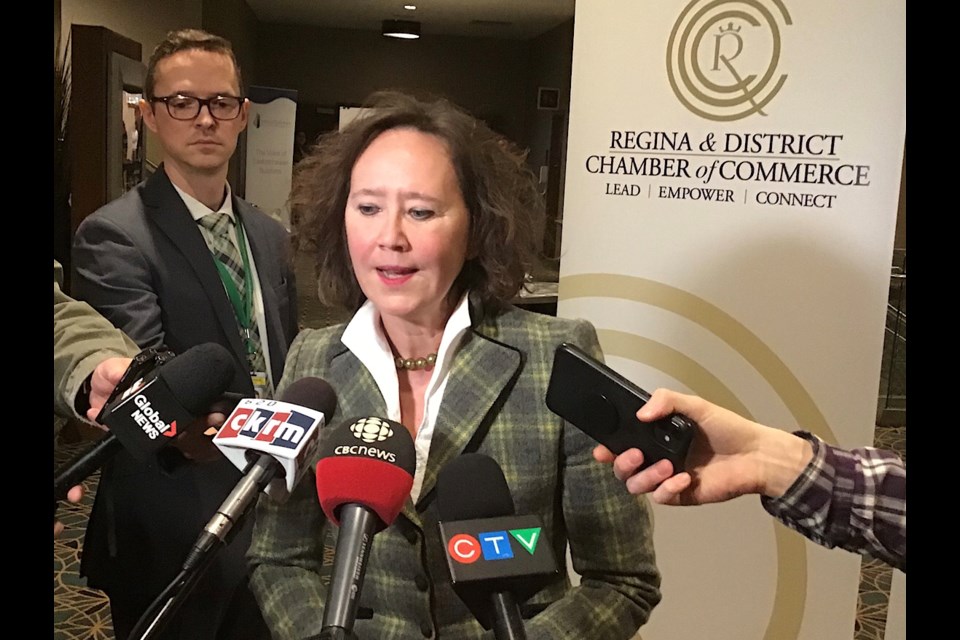REGINA - Concerns about federal intrusion into the provincial economy were still on the mind of Minister of Justice and Attorney General Bronwyn Eyre on Wednesday.
In speaking to reporters following an appearance before a noon Chamber of Commerce audience on Wednesday, Eyre elaborated further on her statement released the previous day on the Trudeau government’s plans for Just Transition legislation aimed at transitioning workers to a green economy.
In that news release Eyre stated that any federal legislation “that eliminates jobs or that reduces output of the most sustainable products in the world will not be accepted by Saskatchewan.”
She reiterated that stance Wednesday to reporters, while also indicating that the Saskatchewan First Act could be among the tools used by the province to protect Saskatchewan jobs from the impacts of the Just Transition legislation.
“Well, certainly, if we're looking at economic harm, once we see what is in the Bill, and the real impact that this Bill could have, one of the tools could be through the Sask First legislation and the parallel economic tribunal that is set up as part of the Saskatchewan First Act,” said Eyre.
The Saskatchewan First Act is the major provincial legislation currently before the Legislature, aimed at strengthening the province’s powers under section 92(A) of the Constitution to protect the resource sector from federal intrusion. Among the features of the Act is the setup of an Economic Tribunal that would assess the economic impact of federal initiatives.
“So certainly, you know, as I say, the focus of the economic tribunal under the Saskatchewan First Act is to assess economic impact, economic harm, put a dollar figure on it. And when we are seeing what could happen with the Just Transition bill, and as the federal government acknowledges itself through its very unvarnished ‘Inconvenient Truth’ report that we've all read in terms of the impact, that is certainly something where if you're talking about economic harm and the economic tribunal under Saskatchewan First, (it) could be run through that process. So we have to see what's in the bill. We're just very concerned about about what will be in it.”
Eyre again emphasized in the media scrum that one of the purposes of her statement the previous day on the Just Transition “was really to emphasize to our Ag workers, our energy workers, our forest workers that we have their backs.”
She reiterated the uncertainty regarding what the legislation might contain.
“The bill is a concern, (we) don't know what’s in the bill. In this case, what we don't know could hurt us. And that's what we are taking so seriously. By the government’s own admission, this will have an impact on jobs. What that impact will be, it could be up to 13 per cent of the Canadian workforce and certainly will have an impact in Saskatchewan as a natural resource province. So we feel it's our problem, and that we have to address it and that we'll do everything we can to protect workers in those sectors. So we are concerned and that's really what we wanted to get across yesterday.”
Eyre also expressed concerns about the experiences other jurisdictions have had. She noted many communities mandated off of coal by the federal government have “faced enormous uncertainty” and “certainly faced job insecurity.”
“Again, you know, it's not only Canada. Scotland, for example, went down this road… $4.9 billion impact in that country. And again, more recently, the province of Ontario in the 2010s went down this path. There were 200,000 manufacturing jobs, good manufacturing jobs that were lost. There were 12,000 that were gained, in alternate energies, but that's, of course, one job gained for every six lost.
“…And in the case of Ontario, the Auditor General, you know, after that experiment, found there had been zero impact in terms of GHG (greenhouse gas) emissions and reducing them for all that pain. So I think they are very important lessons, very sobering lessons, to learn from, from how transition has played out in communities around the world.”
Eyre added that was partly why her government was so concerned about the Just Transition bill.
“What country targets up to 13 per cent of its workforce, and acknowledges that the transition will be very messy in that unvarnished report that was put out there by Blacklock’s as we know. There was talk about an energy worker potentially facing a 70 per cent wage cut. That is not a viable alternative. That is not a match job for job. And so we feel that with Just Transition, we have to look at every option when we see what's in the bill in terms of how we will address it, how we will counter what it means, including under Sask First.”
In her response to Eyre's "Fireside Chat" presentation to the Chamber members in Regina, Saskatchewan Chamber CEO Prabha Ramaswamy indicated they welcomed hearing from the Minister about the Sask First Act.
"We are really pleased that the Minister could come and speak about the Saskatchewan First Act," said Ramaswamy. "It's an important Act, simply because we wanted to know what this means for our business community. And we're glad that we got that information today. It's still, I think I would say, we're still in the early stages in terms of knowing what this actually means. But we were happy to receive that information today."





